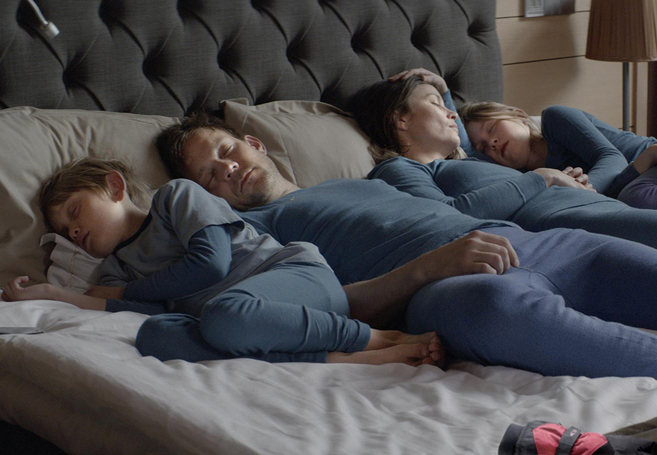When Swedish director Ruben Östlund’s powerful new film Force Majeure bowed at this year’s Cannes Film Festival it took home the coveted Jury Prize in the Un Certain Regard category, and instantly became a major Academy Awards contender. Now the Oscar groundswell of support is gaining worldwide momentum as critics champion the film as an unflinching analysis of contemporary masculinity and as a brilliant critique of marriage at large. The synopsis of Force Majeure reads as follows: “A family on a ski holiday in the French Alps find themselves staring down an avalanche during lunch at a restaurant one day; in the aftermath, their dynamic has been shaken to its core, with a question mark hanging over their patriarch in particular.”
Dana Stevens of Slate and Business Insider writes: “Yet the moral riddle posed by Ebba’s and Tomas’ divergent responses on the deck that morning does matter, and not only because it could end this particular relationship. As the couple’s widening rift exposes the gender and class assumptions that underlie their marriage—Who’s the protector? Who’s the provider? Who, if anyone, can be trusted as far as you can throw them?—”Force Majeure” morphs into a biting critique of modern masculinity, of traditional parenting roles, and possibly of the institution of marriage itself.” Alex Suskind of The Daily Beast adds: “Like the film, whenever I spot this in real life, I am not sure whether to laugh or just feel sad, though perhaps a bit more of the latter. Those on terrible vacations often look like they’ve gone through hell; they have dark circles under their eyes and somber looks on their faces. The director has said the origins of the film were inspired by one question: ‘How do human beings react in sudden and unexpected situations, such as a catastrophe?’ “
In her rave review of the film Jessica Kiang of Indiewire writes: “The simplicity of this central moral dilemma feels so unforced (and kind of “Why did no one think of this before?”-ish) that it suggests its roots in reality; it was in fact based on a real story of a friend of Ostlund’s who couldn’t believe that her husband had run away and left her when a gunman suddenly opened fire. Transposing it to the antiseptic surroundings of an upmarket ski resort, however, enables Ostlund make subtle, Haneke-esque observations about the sterility of the upper-middle-class environment, and just how ill equipped we are, despite, or perhaps because of, all our levels of sophistication to cope when things gets real.”
“Force majeure” is a legal term for the common clause in contracts that essentially frees both parties from liability or obligation when an extraordinary event or circumstance beyond the control of the parties, such as a war, strike, riot, crime, or an event described by the legal term act of God (such as hurricane, flooding, earthquake, volcanic eruption, etc.), prevents one or both parties from fulfilling their obligations under the contract. You can learn more about the film by visiting ForceMajeureFilm.com.


